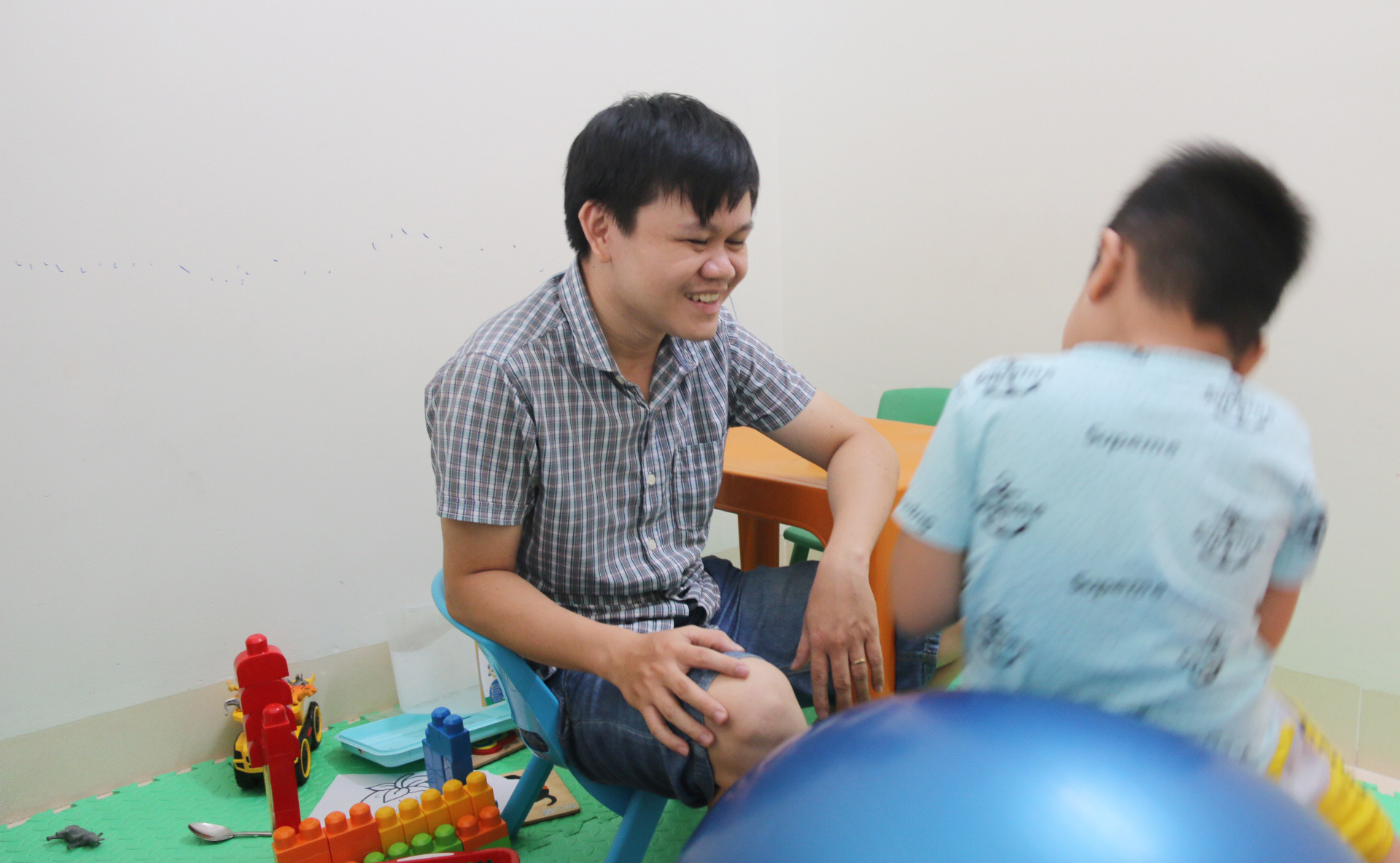Tran Cao Quanh has spent more than 10 years providing education for children with special needs and joining hands with his colleagues in going to great lengths to help their students even amid COVID-19.
As a freshman of the department of educational psychology at Hue University in Hue City, located in central Vietnam, Quanh never thought that one day he would be working with special needs children.
His vision at the time was to become a university lecturer or a high school vocational teacher in his hometown.
Unexpectedly, Quanh was selected for a special training program with German special needs education experts.
He has been in close contact with autistic children ever since and his passion for the job has slowly built.
Simply a calling
C. is the mother of seven-year-old P., a child diagnosed with autism at the age of two.
Every single morning, P. would not be willing to leave his mother’s side to step in class unless teacher Quanh was there to welcome him.
Amid his shrieking and crying, the 32-year-old teacher appeared, saying, “Has P. come already? Come here with me, boy!”
By instinct, the autistic child let go of his mother’s hands and flung himself into Quanh’s arms.
“Many [special needs] children are rejected by kindergartens because it is hard for them to blend in with their peers,” said Quanh.
“They should not be subject to such discrimination.”
His first job recommendation was to be a practitioner at Tinh Truc Gia – a vocational center for disabled teenagers in Hue City, which is the capital of Thua Thien-Hue Province.
However, it was the age group that concerned the young man.
“How about younger children diagnosed with autism?" he wondered.
"With timely intervention, they will have a much better chance of socialization."
Quanh left the job at Tinh Truc Gia and came to the Early Intervention Center in Hue.
This center provides diagnosis and admission to autistic children two years old and above.
A job of joy
There are over 20 autism-affected children at the Early Intervention Center. They are placed in two groups.
The first group is mostly newcomers who learn fundamental self-catering skills.
The second group – the preschoolers – practice writing and reading.
As COVID-19 struck, the center had to close following instructions from the provincial authorities.
School suspension was a major concern for teachers, according to Le Thi Kim Anh, director of the Early Intervention Center.
Their children run the risk of a drastic psychological and biological change over the break, causing rehabilitation a possible challenge.
The teachers, therefore, have decided to visit their children at their private homes to make sure their education continues.
“We are fortunate to have such devoted teachers like Quanh and Cuong," Anh said, referring to another teacher.
"They don’t mind the lengths it takes to help the kids."
Providing this service in the home requires extra preparation on the part of the teachers, according to Quanh.
In case of children’s bites or self-harm behaviors, the teachers are on their own to dissolve the tension.
During his decade of hard work, Quanh and his colleagues have experienced serious injuries from the children’s scratches and bites.
“Once I was carrying this speech delay kid to class when he suddenly bit me in the ear," Quanh recalled.
"It was bleeding.
“It hurt for a week.
"There’s still a scar there.”
“Did you ever think of quitting this job as it’s so intense,” a reporter from Tuoi Tre (Youth) newspaper asked Quanh.
The teacher acknowledged the pressure from the daily loud noises.
“But if everyone thought of it this way, then what would happen to the children?” said Quanh.
“Who would go to the front line if everyone was scared of death?”
The job, however tough, brings him joy.
Looking at a child sitting next to him, he said, “I cried big when he enunciated ‘dad’ and ‘mom’ for the first time.
"The child was diagnosed with delayed speech.
“Another child who developed speech late made it to first grade after several years with us, and he even did very well academically.”
Quanh is married to his colleague, Tran Thi Hong. They hosted a simple wedding reception with the presence of their own autistic children.
“Perhaps it’s these children that brought us together,” said Quanh.
“It felt strangely happy to see their smiles at our wedding party.”
A vocational center for special needs children
There is currently a shortage of environments for autistic children to transfer to after their successful intervention, according to Anh, director of the Early Intervention Center in Hue.
She further explained that the majority of intervention schools in Hue are private businesses, which are not sufficiently funded to establish vocational centers for the children.
“Besides intervention in their behaviors and provision of knowledge, we try to find vocational partners so that the children can learn a trade,” said Anh.
“In the long term, however, I hope the authorities in Thua Thien-Hue Province will build a vocational school just for autistic students.
"That will pave the way even more for their socialization.”
Like us on Facebook or follow us on Twitter to get the latest news about Vietnam!


















































